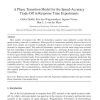Free Online Productivity Tools
i2Speak
i2Symbol
i2OCR
iTex2Img
iWeb2Print
iWeb2Shot
i2Type
iPdf2Split
iPdf2Merge
i2Bopomofo
i2Arabic
i2Style
i2Image
i2PDF
iLatex2Rtf
Sci2ools
COGSCI
2011
2011
A Phase Transition Model for the Speed-Accuracy Trade-Off in Response Time Experiments
Most models of response time (RT) in elementary cognitive tasks implicitly assume that the speed-accuracy trade-off is continuous: When payoffs or instructions gradually increase the level of speed stress, people are assumed to gradually sacrifice response accuracy in exchange for gradual increases in response speed. This trade-off presumably operates over the entire range from accurate but slow responding to fast but chance-level responding (i.e., guessing). In this article, we challenge the assumption of continuity and propose a phase transition model for RTs and accuracy. Analogous to the fast guess model (Ollman, 1966), our model postulates two modes of processing: a guess mode and a stimulus-controlled mode. From catastrophe theory, we derive two important predictions that allow us to test our model against the fast guess model and against the popular class of sequential sampling models. The first prediction—hysteresis in the transitions between guessing and stimuluscontrolle...
| Added | 13 May 2011 |
| Updated | 13 May 2011 |
| Type | Journal |
| Year | 2011 |
| Where | COGSCI |
| Authors | Gilles Dutilh, Eric-Jan Wagenmakers, Ingmar Visser, Han L. J. van der Maas |
Comments (0)

